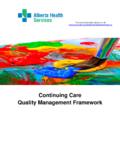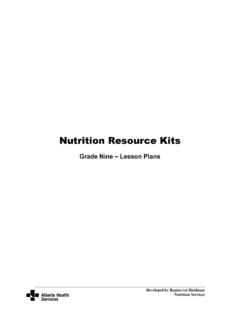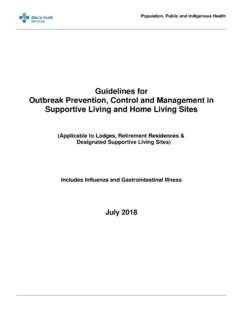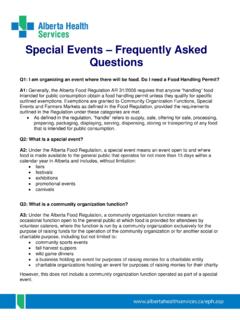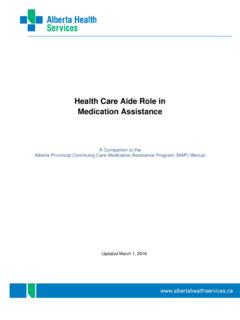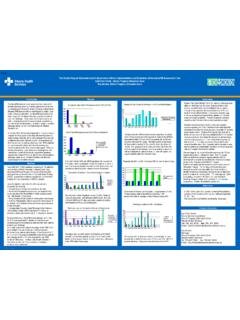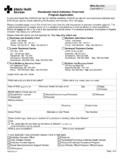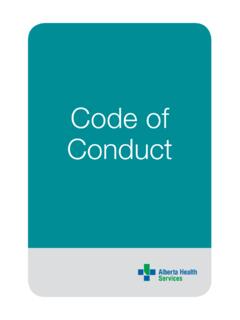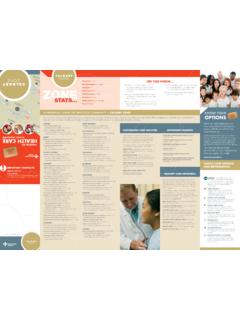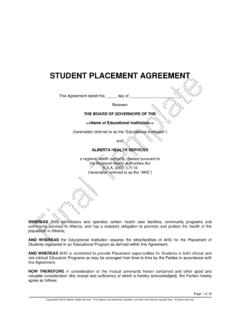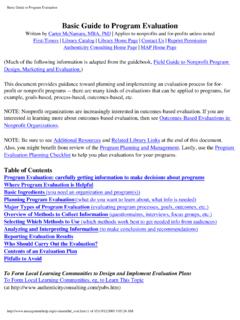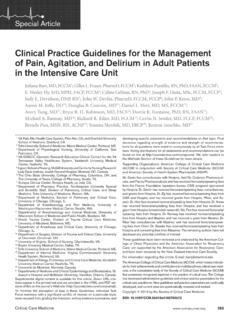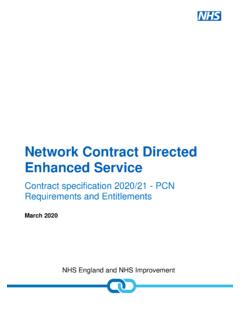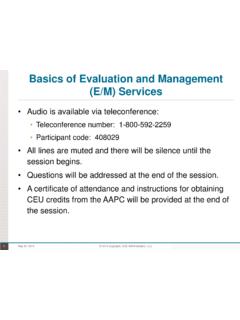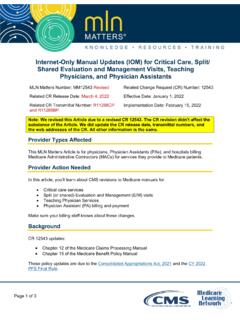Transcription of IPC Management of Severely Immunocompromised COVID …
1 IPC Management of Severely Immunocompromised COVID -19 patients Part 1: Definition for Severely Immunocompromised . Rationale Immunocompromised patients may require an extended duration of Additional Precautions for one or more of the following reasons: reduced immune response in clearing certain infections;. prolonged shedding of a micro-organism;. o Severely Immunocompromised patients may produce replication-competent SARS-CoV-2 virus for prolonged periods beyond 21 days after COVID -19 symptom onset (or after first positive COVID -19 test if asymptomatic throughout);. o the exact criteria that determine which patients will shed replication-competent virus for longer periods are not known.
2 Greater risk of developing or re-activating certain infections;. inadequate or quickly waning protective immune response post-infection;. an atypical presentation of a communicable illness. [See: Infection Prevention and Control Considerations for Immunocompromised patients ]. Definition For the purposes of COVID -19 IPC-related patient Management , special consideration is given to a subset of Immunocompromised patients who are considered to be Severely Immunocompromised .. This list is considered current to the date provided, and is to be used as guidance to identify which patients need further discussion with an IPC physician regarding COVID -19 Management related to clearing of COVID -positive status, cohorting when recovered, re-testing within 90 days of initial infection, etc.
3 Severely Immunocompromised includes: Congenital and acquired immunodeficiency including severe combined immunodeficiency (SCID) and profound hypogammaglobulinemia HIV infection with CD4 T lymphocyte count < 200 (or less than 15%) and unsuppressed viral load For paediatrics o Less than 5 years use CD4 <15%. o 5 years or older use CD4 count <200. Any haematological malignancy Within 24 months of stem cell transplant Solid organ transplant recipients Current receipt of prednisone >20mg/day (or equivalent) for more than 14 days For paediatrics o >2mg/kg body weight for more than 14 days Chimeric antigen receptor (CAR) T-cell therapy in the last 12 months Anti-B cell therapy (current or within last 6 months).
4 O Most common: rituximab, ocrelizumab o Others: 90Y-ibritumomab tiuxetan, ofatumumab, veltuzumab, 131I-tositumomab, obinutuzumab, ocaratuzumab, ublituximab, blinatumomab, inebilizumab, combotox For more information contact Original date: March 2021. Revised date: March 23, 2022. 2022 Alberta Health Services, IPC ECC Approval: March 23, 2022. Management of Severely Immunocompromised COVID -19 patients | 2. o Note: Rituximab and ocrelizumab can be used for autoimmune disorders such as rheumatoid arthritis and multiple sclerosis in addition to chemotherapy regimens. Some immunosuppressants may be used for other medical conditions ( , non-transplant, non-cancer chemotherapy) and may be associated with greater COVID -19 severity and/or worse clinical outcomes ( , mycophenolate mofetil [MMF], tacrolimus, thiopurines such as azathioprine).
5 Consider applicability of these guidelines on a case-by-case basis. Part 2: Discontinuation of COVID -19-related precautions for Severely Immunocompromised inpatients COVID -19 test negative ( patient does not already have a COVID -positive result). o same as non- Immunocompromised patients o see: Discontinuation of Modified Respiratory Precautions for Suspected or Confirmed COVID -19. [Form 21624]. COVID -19 test positive o depends on patient-specific factors such as underlying illness, immunosuppressive medications, and SARS-CoV-2 anti-viral treatments o case-by-case with continuing re-evaluation by specialist physician and/or IPC physician with consideration of the four criteria below.
6 Criteria for clearing COVID -19 positive status 1. At least 21 days since symptom onset (or from COVID -positive test if symptom onset date not known or patient remains asymptomatic);. 2. Fever: Resolution of fever;. 3. Other symptoms: Symptom stabilization/improvement to new or pre-existing baseline for at least 48h;. 4. Follow-up testing. Collect nasopharyngeal (NP) swab on day 22 or later , not throat swab or anterior nares swab o Consult IPC physician if specimen type other than NP was submitted for testing Use laboratory-based PCR testing o Request ProvLab laboratory-developed test if able *A negative test is not required*. o Use cycle threshold (ct.)
7 Value >30 (if previous values available and no symptoms). OR use serial ct. values as applicable o Determine on case-by-case basis in discussion with IPC physician o Contact COVID virologist-on-call if ct. value not otherwise readily available Frequency/interval o to be decided on case-by-case basis after day 22 swab Is there a role for serology? o Not usually. o Unlikely to be of use in patients with hypogammaglobulinemia or who areB- cell depleted. For more information contact Original date: March 2021 31 May 2021. Revised date: March 23, 2022 Page 2 of 7. 2022 Alberta Health Services, IPC ECC Approval: March 23, 2022. Management of Severely Immunocompromised COVID -19 patients | 3.
8 Part 3: Severely Immunocompromised outpatients ( , receiving care within Ambulatory Care or non- inpatient healthcare setting). Refer to IPC Resources for Ambulatory Care Clinics (including Lab Collection sites) and Home Care during COVID -19 Pandemic. Communication is key o Patient letter provided by IPC. o Community healthcare providers o Public Health as needed Duration of isolation in community see Section 4. COVID -19 test negative o same as other patients o see: Discontinuation of Modified Respiratory Precautions for Suspected or Confirmed COVID -19 [Form 21624]. COVID -19 test positive Maintain Modified Respiratory Precautions when visiting a healthcare setting for at least 21 days since symptom onset (or from COVID -positive test if symptom onset date not known or patient remains asymptomatic), or until symptoms improve/resolve whichever is longer.
9 If greater than 21 days since symptom onset/ COVID -positive result AND patient is asymptomatic, then manage without Modified Respiratory Precautions. o In ambulatory setting, patients will wear a procedure mask. o HCWs will also be continuous masking (+/- eye protection). If greater than 21 days since COVID -positive result and patient has any COVID -19 symptoms, then use Modified Respiratory Precautions as per the usual point-of-care risk assessment. Use of Modified Respiratory Precautions includes receiving care/therapy in a private space. Repeat/follow-up testing is not routinely indicated. o However, testing may be indicated based on case-specific factors for individual patients .
10 O Consult IPC physician for advice and guidance as needed. Part 4: Severely Immunocompromised patients in the community ( , not in a healthcare setting). In general, any Severely Immunocompromised patient who tests COVID -positive in the community should: o isolate for 14 days from onset of symptoms OR until symptoms have improved to a new or pre- existing baseline and afebrile for 24 hours without the use of fever-reducing medications . whichever is longer o absence/complete resolution of cough is not required o Some symptoms may linger for more than 14 days ( loss or change of smell or taste). o Repeat/follow-up testing is not routinely indicated.
